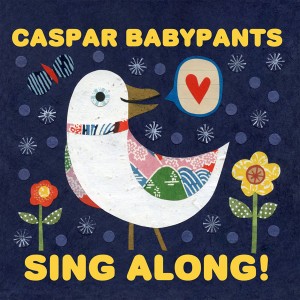The new century has seen plenty of ’90s rockers transition into new careers as family music artists, with some making the leap more unexpectedly than others. The one that’s made arguably the most sense — and yet been one of the most surprising — is Chris Ballew of Presidents of the United States of America, the power trio that made some of the most off-kilter power pop to grace the airwaves during the grunge/buzz bin era. At the time, PotUSA sounded like the latest flavor of winking, flannel-draped irony, but here’s the most ironic twist of all: they really meant it.
Now reborn for younger generations as Caspar Babypants, Ballew has been cranking out spare, thoughtful, goofy, and wonderfully addictive family music since way back in 2009, when he released his first album under the Babypants moniker. Given that he’s already released two more since then, it’s easy to see (and to hear) how gladly Ballew has taken to his new calling. We spoke with Chris recently to find out more about life as Caspar, talk to him about his artistic process, and get a few hints about what’s next for him. Here’s what we talked about.
![4957687488_1a2b20463b[1]](https://www.dadnabbit.com/wp-content/uploads/2011/04/4957687488_1a2b20463b1.jpg) Let’s start by talking about your approach to songwriting, especially as a parent. Do you consciously set aside time for writing, or do you just wait for inspiration to strike?
Let’s start by talking about your approach to songwriting, especially as a parent. Do you consciously set aside time for writing, or do you just wait for inspiration to strike?
Well, I mostly go with the flow. I do set aside the time to tweak ideas. Right now, I have a song called “My Flea Has Dogs,” which came together because I was sitting in the kitchen playing something on the ukulele, and my wife just started singing those words. A lot of times, songs are born from moments like that — moments of inspiration or silliness.
But then, it becomes about the craft — massaging that moment into something that’s finished, something that people are going to want to listen to over and over again. I set aside time for that, but it’s impossible for me to set aside time for inspiration.
One of the things that’s interesting to me about the Caspar Babypants records is how clearly the music represents an extension of the reductive approach you took with the Presidents. It seems like a big part of your process is stripping away non-essential elements.
Yeah, I like limitations. I feel like it focuses the songwriting to have musical limitations, because if you’re going to make a song sound good on a three-, two-, or even a one-string guitar, you’re creating something good enough to be played on pretty much anything. I guess I like leaning more on the melody and the content than the instruments. But that being said, the whole two- or three-string thing has become very special for me, and I can find voicings within that framework that I can’t do on a regular guitar, and it somehow subtly makes the music unique to the listener, whether they know it or not. I think it helps set it apart. Continue reading →
 If you’ve been reading Dadnabbit for any length of time, you already know I’m a huge Caspar Babypants fan. We gave an enthusiastic thumbs up to the last Babypants joint, This Is Fun!, and I had a great time during my conversation with Caspar (a.k.a. Chris Ballew, part-time frontman for Presidents of the United States of America) back in April. The bottom line is that he’s a smart guy who cares a lot about what families listen to together, and he has the instantly addictive songs to prove it.
If you’ve been reading Dadnabbit for any length of time, you already know I’m a huge Caspar Babypants fan. We gave an enthusiastic thumbs up to the last Babypants joint, This Is Fun!, and I had a great time during my conversation with Caspar (a.k.a. Chris Ballew, part-time frontman for Presidents of the United States of America) back in April. The bottom line is that he’s a smart guy who cares a lot about what families listen to together, and he has the instantly addictive songs to prove it.
![61syUmtubnL._SS500_[1]](https://www.dadnabbit.com/wp-content/uploads/2011/05/61syUmtubnL._SS500_1.jpg)
